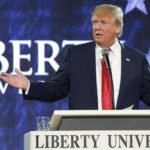A lot of theories explain why large swaths of evangelicals seem to like a narcissistic, vulgar, misogynistic, intolerant and angry reality TV star who behaves like a schoolyard bully and has a temperament diametrically opposed to the meekness, humility and prudence necessary to lead the free world. I will not rehearse them here.
But as a historian, it also is my job to take a longer view—to look deeper into the American evangelical past in search for answers. Is something inherent within American evangelicalism, as it has developed over the decades, that led so many born-again Christians to vote for Trump?
I think so.
In 1994, Mark Noll, a history professor at evangelical Wheaton College published The Scandal of the Evangelical Mind. The book begins with a much-quoted phrase among evangelical intelligentsia: “The scandal of the evangelical mind is that there is not much of an evangelical mind.” Noll then goes on to describe a deep-seated anti-intellectual impulse that long characterized American evangelicalism.
Ten years after it was published, the editors of Christianity Today claimed Noll’s book “arguably shaped the evangelical world (or at least its institutions) more than any other book in the last decade.”
On one level, Christianity Today was correct. The evangelical mind is doing better these days. Young evangelicals now see pursuit of an intellectual life as a legitimate Christian calling. They are contributing to a vibrant renaissance of Christian thinking about history, politics, science, nature and the arts.
Scandal, still
But the scandal still exists.
Conservative Protestants have a long way to go if they want to rid themselves of the anti-intellectual populism Noll lamented almost a quarter-century ago. Evangelical churches and colleges have failed to educate people on how to think Christianly about their role as citizens. They have failed to teach their constituencies Christian habits of acting in the world that allow them to make meaningful contributions to American democracy. Is it any wonder so many evangelicals have cast votes for Donald Trump?
Sign up for our weekly edition and get all our headlines in your inbox on Thursdays
Part of the responsibility for bringing a more thoughtful understanding of politics and culture to everyday conservative Protestants rests with evangelical intellectuals.
It would be nice if evangelical scholars could play a more sustained role in their churches, but often they are too busy writing, teaching students and serving their academic institutions to help people in the pews think more deeply about these issues.
No trickling down
And then there are the evangelical colleges. It often is unclear how these institutions serve the larger evangelical world. Christian philosopher and educator Richard Mouw tried to explain their impact in 1995 when he wrote: “Tens of thousands of young people in Christian evangelical colleges and seminaries are receiving a trickle-down effect from their professor’s work. These are future laypeople.”
I am sympathetic to Mouw and those who hope for an intellectual trickle-down effect, but such an approach does not seem to be working.
Evangelical students no longer are interested in studying the humanities.
Enrollments in humanities fields—history, philosophy, literature, theology—at evangelical colleges have experienced a precipitous decline over the last decade. Yet these are disciplines that teach evangelical young people how to live together with their deepest differences, reflect on the purpose of life, think critically about the world, cultivate moral courage, make evidence-based arguments and recognize life does not always fit easily into binary categories.
The heart of Christian education
These are the subjects that raise the questions that go to the heart of a Christian education. They help us see the world from the perspective of others and teach us humility as we ponder our place in the expanse of human history. They help us understand the common good and serve it. They make us informed citizens.
Unfortunately, we are training evangelicals for our capitalist economy. We are not training them for life in our democracy.
Many Christian colleges are just trying to keep the doors open. Physical therapy and accounting majors bring in a lot of tuition revenue. If students do not want to study the humanities, then these institutions are happy to offer programs—ever more programs—they will want to pursue. Such colleges must bow to consumer needs in order to survive. Give them what they want, not what they need.
Churches and pastors
Evangelical churches and their pastors also are to blame. How many evangelical churches have created spaces where conversations can take place about how to apply the Christian faith to culture, politics, art, nature or our understanding of the past and its relationship to the present?
I am not saying these topics need to be addressed during Sunday morning services. This time and space needs to be reserved for worship. But certainly some of our megachurches could make room for this kind of training.
In the end, I do not have much patience for evangelical leaders who are shocked and surprised so many people support Donald Trump. We have reaped what we have sown. We evangelicals can, and must, do better.
John Fea teaches American history at Messiah College in Mechanicsburg, Pa. He is the author of The Bible Cause: A History of the American Bible Society. Follow him @johnfea1. Religion News Service distributed his column.














We seek to connect God’s story and God’s people around the world. To learn more about God’s story, click here.
Send comments and feedback to Eric Black, our editor. For comments to be published, please specify “letter to the editor.” Maximum length for publication is 300 words.